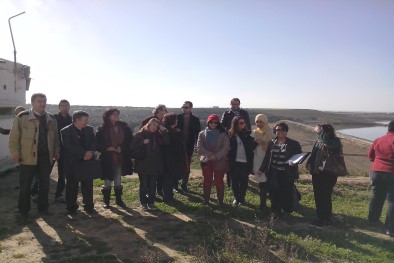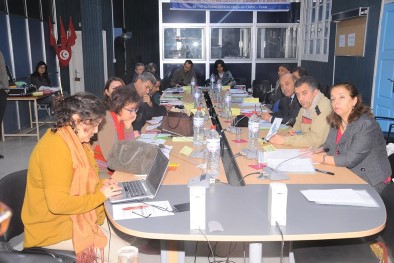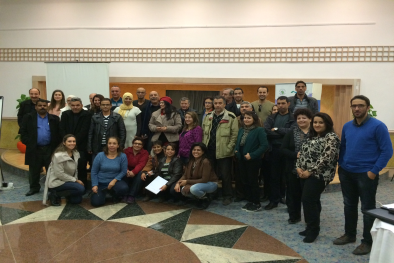This 3rd workshop training comes to provide participants with the appropriate tools to deliver solutions towards water security and climate resilient development, following the first workshop’s focus on providing participants with the tools to understand the issues related to Integrated Water Resources Management (IWRM) and Climate change, and the second workshop’s focus on the identification and appraising of possible solutions and investment options. This time, the focus lies on the integration and mainstreaming of climate resilience in development planning, as well as the development of relevant financing and investment strategies.
The workshop training included a field visit to the Lebna Dam and the Oued Souhil pilot wastewater treatment site, in the Nabeul region at the east coastal area of Tunisia. The field visit aimed to both provide the participants with an idea about the water management challenge under continuously rising water demand and competition between various economy sectors for sufficient water resources, as well as its tremendous importance given the climate change effects, and to offer them an example of a climate resilient alternative solution - based on non-conventional water resources - in the agricultural sector, with the use of treated wastewater, as experimented at the Oued Souhil Station.

The Capacity Building Programme generally targets a group of 19 participants involved in water management and development planning in Tunisia, including national and local authorities’ representatives, NGOs and independent experts.
"Sustainable water management challenges under climate change stress”: Training the media on Climate Resilience
This time, the capacity building programme’s participants were joined in the debates and the field visit by a group of journalists participating to the media workshop "Sustainable water management challenges under climate change stress” held in Tunis, on December 23-24, 2014, in the framework of the WACDEP Program.

The journalists’ involvement in the discussions led to many questions reflecting the societies’ concerns, while the role play game with participants from both groups enlightened all on the importance of communication between the planning authorities and stakeholders on the one hand and the media on the other hand, to enhance knowledge and awareness on water security and climate change in the region.
Among other, the WACDEP Program aims to enhance collaboration between the North Western Sahara Aquifer System countries, Algeria, Libya and Tunisia, for sustainable water management, by supporting them at technical and decision-making level. To achieve that, WACDEP mobilizes media and journalists to raise the voice for better-coordinated water management.
In this context, the Global Water Partnership – Mediterranean (GWP-Med) organized in partnership with the African Center of improvement for journalists and communicators (CAPJC) and the NGO Children of Earth Network (RET), a workshop with 18 Tunisian and Algerian journalists from radio, TV, print and online press, in order to establish a circle of journalists qualified on water management and climate change, equipped with the appropriate tools and knowledge to understand, analyze and communicate on these issues. No journalists from Libya have been able to join the workshop due to the political situation in the country.
Other than the journalists’ joining the capacity building programme’s participants on the second day of the media training, which offered both groups the opportunity for enriching discussions, the latter focused on regional conferences on Sustainable Integrated Water Management, its importance towards adaptation to climate change, and the presentation of the WACDEP Program.

